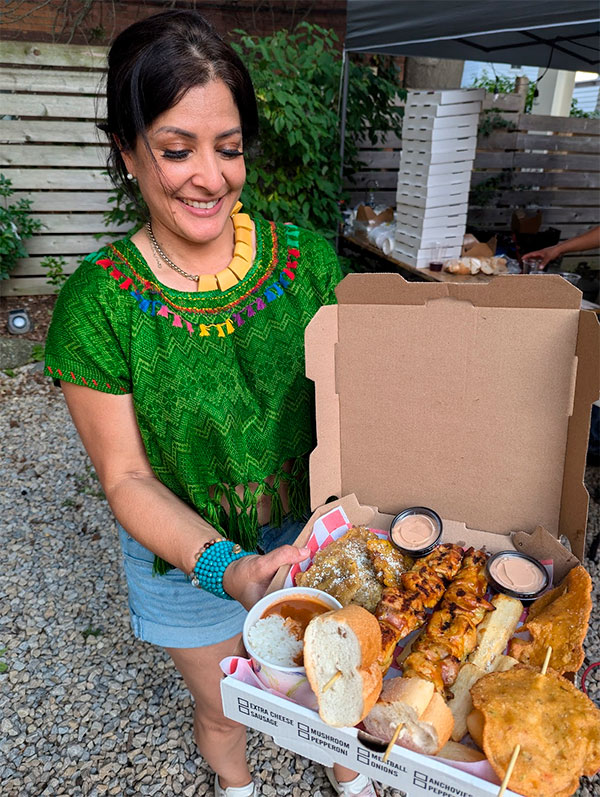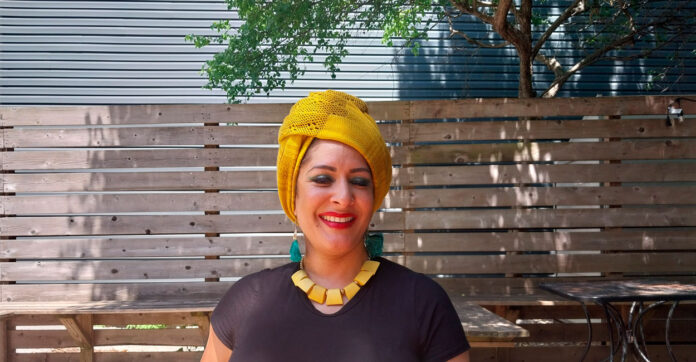Puerto Ricans have been U.S. citizens since 1917, following the approval of the Jones Act by Congress. For Mariangeli Alicea Saez, a native of Humacao who immigrated to Pennsylvania over 20 years ago, “it’s not until you get here that you realize that citizenship is quite limited.”
Initially, she lived in a suburb, which was a lonely experience for her. When walking through her neighborhood, people frequently asked where she was from and often commented that she didn’t look Puerto Rican or speak or dress like one. “And you start to realize that there is a very wrong perspective and narrative about Puerto Rico.”
Mariangeli began asking these people if they knew where Puerto Rico was, and many didn’t even know the geographic location of the archipelago, which includes the main island, Vieques, and Culebra.
Together with her husband, Chef Dionicio Jiménez, the co-owner of the restaurant “Cantina La Martina,” she opened a space called “La Placita” in June at 2217 Frankford Avenue in the Fishtown neighborhood.
The New Kensington Community Development Corporation (NKCDC) and the Fishtown community selected her to propose how to utilize the land, a historic site with a streetcar.

In a conversation with the entrepreneur, we learned that this place emerged from a desire she had been nurturing for 20 years—the need to educate people about Puerto Rico, its social, economic, and political system, why Puerto Ricans emigrated, and the work they have done as a Latino community for over 200 years.
“We Puerto Ricans have remained silent, and I believe that the space of ‘La Placita’ is very important to share the richness of our culture and history and that resistance we are still experiencing because we are still a colony. There is no better way to talk about these controversial issues than with our food, our music, our dance, our smile, maybe as we have done for many years,” she says.
In her view, this cultural space is also relevant because there is a separation between Puerto Ricans born outside the archipelago and those living in Puerto Rico, “and if you analyze that in your daily life, you realize that it is a systematic strategy, and it is very important for us to unite as a community because we are Puerto Ricans, even if we were born on the moon, as Roy Brown said in his lyrics.”

A year and a half ago, Mariangeli started collaborating with Chef Dionicio Jiménez at “Cantina La Martina.” She noticed that many Puerto Ricans had immigrated to Kensington due to Hurricane Maria and the earthquakes in the western part of Puerto Rico.
Seeing the conditions they were living in “rekindled that desire to say, I have to talk about this, I have to create something to have a space where we can discuss these issues.”
She has built strong relationships in the community with nonprofit organizations with which she works daily to bring peace and hope to that community.

When making the proposal for “La Placita,” she read the history of the Fishtown neighborhood and noted that it included the displacement of many Puerto Ricans who took care of the community’s plots for many years, especially “when the city of Philadelphia didn’t want to deal with the issues of drug addiction and neglect, and many Puerto Ricans arrived and cared for their little plots and small farms.”
In June, they started the “La Placita” project and opened the space to the public that month.
On July 7, Mariangeli presented “Bomberos de la Calle,” who gave an educational workshop on plena and bomba and invited the public to play the panderos and dance Afro-Puerto Rican dances.
Regarding the future cultural program, she reported that she is working with Taller Puertorriqueño, one of the oldest agencies and a very strong community organization, “an anchor, I would say, for the Puerto Rican community, and I have had conversations with the staff to see how we can bring some of their workshops and programming.”

The interest of “La Placita” is also to educate non-Puerto Ricans, “so that when they see us speaking loudly, they can understand our culture and know our history.”
Additionally, she has been talking with the staff at Esperanza Arts Center, a leading organization in Puerto Rican culture, and with Marangeli Mejía Rabell, co-founder of Afrotaino.

Mariangeli has spoken with several activists, and one of the issues closest to her heart is Vieques. “My mother is from Vieques, and I know what happened during and after the Navy left that island over 15 years ago, and the trauma, cancer, and devastation of the land and economy continue.”

She has a group of Puerto Rican mentors who have already paved the way “to make this a space that is truly educational and healing. I believe that our Puerto Rican people need to heal many things that have been in our lineage for many years,” concludes this committed cultural promoter of impact.







